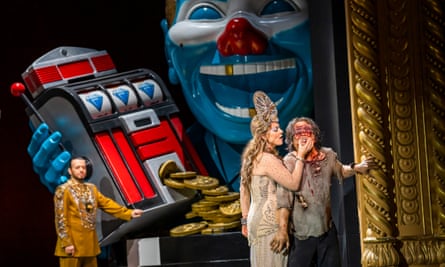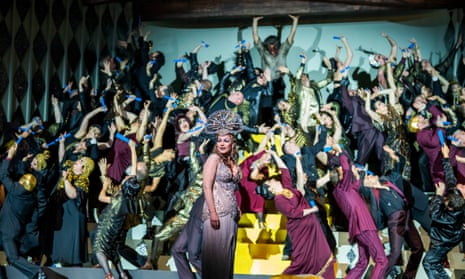Where does Samson get his strength from? His hair, of course: those gorgeous locks that are warming the tenor SeokJong Baek’s back as he makes a mightily impressive Royal Opera stage debut. Delilah’s realisation that a few chops of the scissors will render him puny and the Philistines triumphant is a pivotal moment of the Old Testament story, but in Saint-Saëns’s opera this revelation happens offstage, unsung.
Samson et Dalila has endured thanks to its glorious music rather than to any particular dramaturgical nous on the part of its creators – the fact that Saint-Saëns intended to write a concert oratorio on the subject, not a staged opera, is telling. So maybe it shouldn’t be a surprise that, despite the Royal Opera throwing its considerable weight behind this new production, it doesn’t strike a corresponding number of dramatic sparks.

That’s not necessarily the fault of Richard Jones’s production, which looks stylish in set designs – by Hyemi Shin – that are initially lean and streamlined. A black-and-white box is lined on all sides with steps in Act 1, backdrop for the almost ritualised movement of the chorus of Israelites, with a wide and similarly monochrome room for Delilah’s house in Act 2, empty but for a ceiling fan that’s a visual reflection of the sultry, lazily whirling music in the orchestra. Tackiness takes over for Act 3, as the blinged-up Philistines line-dance awkwardly in the shadow of a huge plastic representation of Dagon – here a gambling god, bearing poker chips and a slot machine. Dagon’s High Priest is some kind of former Soviet secret policeman who, with his fur-collared bomber jacket and greasy hair, is out of place but still swaggering in the banana republic where the gold-scalped governor Abimélech and his goons hold sway.
It’s a mishmash of references but an evocative one, and all those flat surfaces send the voices ringing into the auditorium. Baek sounds every inch the hero, his bright tenor cutting through above the dark orchestral sonorities, but there’s little heat between him and the steely Delilah of Elīna Garanča, who is at her best in the triumph of Act 3. Blaise Malaba, Lukasz Golinski and Goderdzi Janelidze make the most of their supporting roles, and the chorus, its ranks swollen considerably for the occasion, is on impressive form. Conducted by Antonio Pappano, the orchestra relishes the melodious score without wallowing in its lushness, however great the temptation.

Comments (…)
Sign in or create your Guardian account to join the discussion